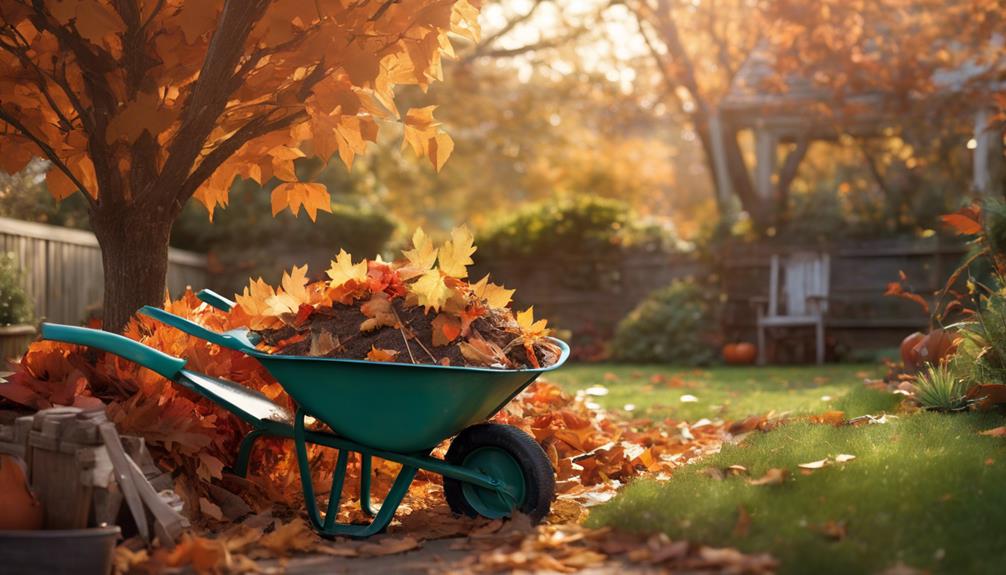
3 Seasonal Lawn Care Tips for Homeowners
9 March 2025
Why Choose Eco-Friendly Spring Garden Cleanup Options?
9 March 2025A complete guide to seasonal garden cleanup is essential for promoting a healthy garden ecosystem. It involves removing organic debris to improve soil structure and nutrient availability while preventing the build-up of pathogens and pests.
Key tools, such as pruning shears and rakes, help enhance efficiency. Implementing pest control strategies, such as companion planting and mulching, fosters plant resilience and productivity.
Timing is critical for applying fertilisers and fungicides to support optimal growth. Regular cleanup not only prepares your garden for the next season but also enriches it.
For thorough techniques and insights into effective practices, further exploration will yield beneficial information.
Seasonal Cleanup Importance
Seasonal garden cleanup is essential for maintaining healthier soil and promoting overall plant vitality.
By removing debris and decaying matter, gardeners can enhance soil structure and nutrient availability, fostering a more robust growing environment.
Furthermore, effective cleanup serves as a proactive strategy for pest control, reducing the likelihood of infestations in the forthcoming growing season.
Healthier Soil Benefits
Maintaining healthy soil is essential for a thriving garden, and regular cleanup efforts play a significant role in this process. The removal of organic debris, such as fallen leaves and spent plant material, prevents the build-up of pathogens and pests that can compromise soil health.
This practice encourages beneficial microbial activity, which improves nutrient cycling and enhances soil structure. Moreover, seasonal cleanup facilitates better air and water infiltration, fostering an ideal environment for root development.
By incorporating compost and organic matter during cleanup, gardeners can further enrich the soil, promoting a diverse ecosystem that supports robust plant growth.
Ultimately, diligent cleanup practices yield healthier soil, which is foundational to achieving a flourishing and sustainable garden.
Pest Control Strategies
Effective pest control is an essential aspect of garden management, and seasonal cleanup plays a crucial role in this strategy. By meticulously removing debris, fallen leaves, and dead plant material, gardeners eliminate habitats that attract pests and diseases. This proactive approach reduces the likelihood of infestations and promotes a healthier ecosystem.
Moreover, seasonal cleanup allows for the inspection of plants and soil, enabling early detection of pest issues, such as eggs or larvae. Implementing barriers, such as row covers or traps, during this phase can also enhance protection.
In addition, integrating companion planting and maintaining biodiversity through seasonal cleanup can create a natural balance that deters harmful insects while encouraging beneficial ones. Ultimately, a thorough cleanup fosters resilience in your garden against pest threats.
Soil Health Considerations
Maintaining soil health is essential for a thriving garden, and effective seasonal cleanup plays a key role in this process.
By focusing on organic matter decomposition, pest and weed management, and increasing microbial activity, gardeners can enhance soil fertility and resilience.
Implementing these strategies not only promotes a healthier ecosystem but also supports sustainable gardening practices.
Organic Matter Decomposition
Organic matter decomposition plays a vital role in enhancing soil health and fertility. This process involves the breakdown of organic materials, such as plant residues and animal waste, which significantly contributes to soil structure and nutrient availability.
Understanding the dynamics of decomposition is crucial for optimising garden productivity and sustainability.
Key benefits of organic matter decomposition include:
- Nutrient Release: Essential nutrients are released, making them readily available for plant uptake.
- Soil Structure Improvement: Enhanced aggregation and porosity promote better water infiltration and root development.
- Microbial Activity Stimulation: A diverse microbial community flourishes, aiding in nutrient cycling and disease suppression.
Pest and Weed Management
Pest and weed management is essential for preserving soil health and ensuring a productive garden environment. By effectively controlling pests and weeds, gardeners can maintain the integrity of the soil ecosystem, facilitating nutrient availability and promoting plant growth.
Implementing strategic practices will yield significant benefits.
- Regular Monitoring: Observe your garden frequently to identify pest and weed populations early.
- Integrated Pest Management (IPM): Combine biological, cultural, and mechanical methods to minimise chemical use while managing infestations.
- Mulching: Apply organic mulch to suppress weeds, retain moisture, and improve soil structure as it decomposes.
Focusing on these strategies not only protects your plants but also enhances the general health of the soil, laying a foundation for long-term garden success.
Microbial Activity Boost
A thriving garden is not only the result of effective pest and weed management but also relies heavily on robust microbial activity within the soil.
Enhancing microbial health is essential for nutrient cycling, organic matter decomposition, and disease suppression. To stimulate microbial activity during seasonal cleanup, consider implementing the following strategies:
- Add organic matter: Incorporate compost or well-rotted manure to provide a diverse food source for soil microorganisms.
- Avoid chemical fertilisers: Opt for natural amendments that support microbial proliferation rather than inhibit it.
- Implement crop rotation: Diversifying plant species prevents soil nutrient depletion and fosters a diverse microbial community.
Gather Necessary Cleanup Tools
To effectively tackle garden cleanup, it is crucial to gather the right tools and supplies.
A well-equipped workspace not only improves efficiency but also supports practices such as mulching for moisture retention and implementing companion planting strategies.
Gather Essential Gardening Supplies
Successful seasonal garden clean-up hinges on having the right tools at your disposal.
Equipping yourself with essential gardening supplies not only improves efficiency but also ensures that you tackle each task with precision.
To facilitate a thorough clean-up, consider gathering the following items:
- Pruning Shears: Ideal for trimming overgrown plants and removing dead foliage.
- Garden Rake: Vital for gathering leaves and debris, promoting a tidy appearance.
- Garden Gloves: Protect your hands while providing a secure grip for various tasks.
Mulching for Moisture Retention
After gathering the necessary gardening supplies, attention turns to a significant aspect of seasonal clean-up: mulching for moisture retention.
Effective mulching not only conserves soil moisture but also suppresses weeds and improves soil health. Selecting the right type of mulch is vital for achieving ideal results.
Consider the following options:
- Organic Mulch: Such as wood chips, straw, or shredded leaves, which decompose and enrich the soil.
- Inorganic Mulch: Including gravel or landscape fabric, providing durability and effective weed control.
- Living Mulch: Ground covers like clover that enhance soil structure while retaining moisture.
Applying a layer of mulch several inches thick around plants can dramatically reduce evaporation, ensuring your garden thrives through dry seasons whilst promoting sustainable gardening practices.
Companion Planting Strategies
Companion planting is a strategic practice that enhances garden productivity by pairing compatible plants that benefit each other. This method improves nutrient uptake, pest management, and overall plant health.
By understanding the relationships between different species, gardeners can create a more resilient ecosystem.
Consider these effective companion planting strategies:
- Nutrient Sharing: Pair deep-rooted plants, such as tomatoes, with shallow-rooted companions, like basil, to optimise soil nutrient use.
- Pest Deterrence: Use marigolds alongside vegetables to repel harmful insects and attract beneficial pollinators.
- Support Growth: Climbing plants, such as peas, can provide support for other crops, maximising vertical space.
Implementing these strategies not only fosters a thriving garden but also increases biodiversity and sustainability within your gardening practices.
Improved Plant Resilience
Strengthening plant resilience is a crucial aspect of maintaining a vibrant garden throughout the changing seasons. Implementing strategic practices during seasonal cleanup can greatly enhance the robustness of your plants. By fostering a healthy soil ecosystem, selecting appropriate plant varieties, and managing environmental stressors, you can cultivate a garden that withstands seasonal challenges.
| Strategy | Benefits |
|---|---|
| Soil Enrichment | Improves nutrient availability |
| Diverse Planting | Increases pest resistance |
| Mulching | Regulates soil temperature |
Incorporating these strategies ensures that your garden is not only visually appealing but also equipped to thrive despite climatic fluctuations. Mastery in these areas lays the groundwork for a resilient and flourishing garden.
Seasonal Plant Care Techniques
Effective seasonal plant care techniques are crucial for maintaining a healthy garden.
Key practices include timely application of fertilisers, both synthetic and organic, as well as the use of fungicides to prevent diseases.
Understanding the optimal timing for these applications can significantly enhance plant growth and resilience throughout the changing seasons.
Fertilizer Application Timing
Timing is crucial when it comes to fertiliser application in seasonal plant care, as it directly influences plant health and growth.
Proper scheduling ensures that nutrients are available when plants can best utilise them, promoting robust development.
Consider the following key timings for fertiliser application:
- Early Spring: Apply a balanced fertiliser to support new growth as plants emerge from dormancy.
- Mid-Summer: Use a slow-release fertiliser to sustain growth during the peak growing season, particularly for heavy feeders.
- Autumn: Fertilise with a low-nitrogen formula to improve root development and prepare plants for winter.
Mastering these timings will allow for optimal nutrient uptake, resulting in vigorous plants and a flourishing garden throughout the seasons.
Fungicide for Disease Prevention
Preventing plant diseases is essential for maintaining a healthy garden, and the strategic use of fungicides can play a pivotal role in this effort.
To effectively utilise fungicides for disease prevention, consider the following techniques:
- Timing: Apply fungicides at the onset of disease symptoms or as a preventive measure during high-risk periods.
- Selection: Choose fungicides that target specific pathogens relevant to your garden's plant varieties.
- Application Method: Ensure even coverage by utilising appropriate application techniques, such as sprayers or soil drenches.
Incorporating these strategies will not only improve plant resilience but also foster a thriving garden ecosystem.
Keep in mind that fungicides should complement other cultural practices for peak effectiveness and sustainability in disease management.
Organic Fertilizer Application Timing
The health of your garden is not solely reliant on disease prevention; it also hinges on the proper application of organic fertilisers to support plant growth.
Understanding the timing of fertiliser application is essential for maximising nutrient absorption and enhancing soil health.
Consider these ideal periods for application:
- Pre-planting: Enrich the soil with organic matter before planting to establish a nutrient-rich environment.
- Mid-season: Apply fertilisers during the growing season to replenish nutrients, especially after heavy rainfall or growth spurts.
- Post-harvest: Incorporate organic fertilisers to prepare the soil for the following season, ensuring sustained fertility.
Mastering these timings will enable you to cultivate a thriving garden, rich in energy and resilience.
Pest Infestation Management Tips
Effective pest management is essential for maintaining a healthy garden ecosystem.
Techniques such as companion planting can deter unwanted pests, while the introduction of natural predators can help regulate pest populations.
Furthermore, using mulch not only suppresses weeds but can also create an environment that is less conducive to pest infestations.
Companion Planting for Pest Control
Companion planting serves as a natural strategy for managing pest infestations in gardens, utilising the symbiotic relationships between different plant species.
By strategically pairing plants, gardeners can improve pest control, boost crop yields, and promote overall plant health.
Here are some key pairings to consider:
- Marigolds with Tomatoes: Marigolds emit a scent that deters nematodes and whiteflies, offering protection to tomato plants.
- Basil with Peppers: Basil repels aphids and spider mites, whilst also enhancing the flavour of nearby pepper plants.
- Nasturtiums with Cabbage: Nasturtiums act as a trap crop, luring aphids away from cabbage and other brassicas.
Implementing these combinations not only minimises chemical interventions but also fosters a thriving ecosystem within your garden.
Embrace the art of companion planting to enhance your gardening efforts.
Natural Predators Introduction
Integrating natural predators into your garden ecosystem provides an additional layer of pest management that complements the strategies employed through companion planting.
By inviting these beneficial creatures into your garden, you can effectively reduce pest populations without resorting to chemical interventions.
To successfully introduce natural predators, consider the following:
- Diversity of Plant Life: Cultivate a variety of plants to attract different predators, thereby enhancing biodiversity.
- Shelter and Water Sources: Provide habitats, such as insect hotels and shallow water dishes, to encourage predator residency.
- Avoid Chemical Pesticides: Minimise or eliminate chemical pesticides that could harm beneficial species, ensuring their effectiveness.
Mulch to Suppress Weeds
A well-maintained garden often relies on the strategic use of mulch to suppress weeds, which can otherwise compete for nutrients and resources.
By creating a barrier that blocks sunlight and retains moisture, mulch not only mitigates weed growth but also improves soil health.
To optimise the effectiveness of mulch, consider the following practices:
- Select the Right Material: Organic options such as wood chips, straw, or shredded leaves enrich the soil as they decompose.
- Apply Adequate Depth: A layer of 5-10 centimetres is typically sufficient to inhibit weed germination while preventing moisture loss.
- Replenish Regularly: Over time, mulch can break down and thin out; as a result, reapplication is necessary to maintain its efficacy.
Implementing these strategies will ensure your garden remains vibrant and weed-free.
Why Choose TKL Birmingham Gardener
Choosing TKL Birmingham Gardener for your seasonal garden clean-up guarantees a meticulous approach to maintaining your outdoor space.
Our team of experienced professionals employs best practices tailored to your garden's unique needs, ensuring an ideal environment for plant health and growth. We utilise advanced techniques and eco-friendly materials, resulting in a sustainable and visually appealing landscape.
Moreover, our commitment to excellence extends beyond mere aesthetics; we prioritise the long-term health of your garden ecosystem.
By evaluating soil quality, plant health, and seasonal requirements, we create a comprehensive clean-up plan that fosters resilience against pests and diseases.
Opting for TKL Birmingham Gardener means investing in a partnership that enhances your garden's beauty while promoting sustainable practices for lasting enjoyment.
Common Gardening Questions Answered
Many gardeners find themselves with a multitude of questions as they navigate the complexities of cultivating their green spaces. Common inquiries often revolve around soil health, pest management, and plant selection.
For instance, understanding the nutrient requirements of different plants is vital; using soil testing kits can provide valuable insights. In addition, effective pest control requires knowledge of integrated pest management strategies, which prioritise ecological balance.
When selecting plants, considering their compatibility with local climate conditions and soil types is fundamental for ideal growth. Moreover, gardeners frequently ask about the best practices for watering and pruning.
Mastery in gardening comes from continual learning and adapting techniques based on experience, ensuring that each season contributes to the overall health and beauty of the garden.
Final Cleanup Checklist
As the gardening season comes to a close, a thorough final cleanup is essential for preparing the garden for winter and ensuring a healthy start in the spring.
This process not only protects your plants but also enhances the overall appearance of your garden.
To achieve an effective cleanup, consider the following checklist:
- Remove Debris: Clear away fallen leaves, dead plants, and any garden waste to prevent pests and diseases from overwintering.
- Prune and Trim: Cut back perennials, shrubs, and trees as necessary to promote healthy growth in the coming season.
- Amend Soil: Add compost or organic matter to enrich the soil, ensuring ideal nutrient availability for spring planting.




